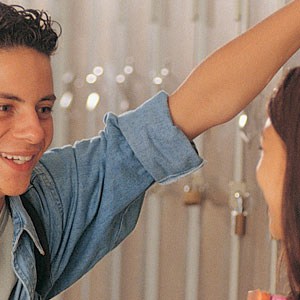
Honoring Parents in the Teen Years
Teens, by nature, tend to struggle with parental authority. On today's broadcast, Dennis and Barbara Rainey and their kids, Samuel and Rebecca, talk about honoring parents.
Show Notes
About the Host
About the Guest
-
Teens, by nature, tend to struggle with parental authority. On today's broadcast, Dennis and Barbara Rainey and their kids, Samuel and Rebecca, talk about honoring parents.
-
Dave and Ann Wilson
Dave and Ann Wilson are hosts of FamilyLife Today®, FamilyLife’s nationally-syndicated radio program. Dave and Ann have been married for more than 38 years and have spent the last 33 teaching and mentoring couples and parents across the country. They have been featured speakers at FamilyLife’s Weekend to Remember® marriage getaway since 1993 and have also hosted their own marriage conferences across the country. Cofounders of Kensington Church—a national, multicampus church that hosts more than 14,000 visitors every weekend—the Wilsons are the creative force behind DVD teaching series Rock Your Marriage and The Survival Guide To Parenting, as well as authors of the recently released book Vertical Marriage (Zondervan, 2019). Dave is a graduate of the International School of Theology, where he received a Master of Divinity degree. A Ball State University Hall of Fame quarterback, Dave served the Detroit Lions as chaplain for 33 years. Ann attended the University of Kentucky. She has been active alongside Dave in ministry as a speaker, writer, small-group leader, and mentor to countless wives of professional athletes. The Wilsons live in the Detroit area. They have three grown sons, CJ, Austin, and Cody, three daughters-in-law, and a growing number of grandchildren.
-

Dennis and Barbara Rainey
Dennis and Barbara Rainey cofounded FamilyLife®, a ministry of Cru®. Their 43+ years of leadership enabled FamilyLife to grow into a dynamic and vital ministry in more than 109 countries. Together they have spoken at over 150 Weekend to Remember® marriage getaways and authored or co-authored more than 35 books, including best-selling Moments Together for Couples, Staying Close, A Symphony in the Dark, and Barbara’s most recent, Letters to My Daughters: The Art of Being a Wife...more
Rebecca (Rainey) Mutz
Rebecca (Rainey) Mutz and her husband Jake live in Colorado with their children. Besides writing, she loves to cook, bake, decorate, read, and enjoy the beauty of the great outdoors. Rebecca shares openly shares the story of her grief, healing, and hope in regards to her children Molly Ann, Micah William, and two others lost through miscarriage. Jake and Rebecca Mutz hope to use their daughter Molly’s life as a way to share Christ with others and bring glory to God. Rebecca co-authored a boo...moreSamuel Rainey
Samuel Rainey is a professional counselor primarily working with couples, men, and women addressing issues of sexuality, emotional health, relationships, and spirituality. He is the co-Author of So You Want to be a Teenager with Thomas Nelson. He earned his Masters in Counseling Psychology from The Seattle School of Theology and Psychology in Seattle, Washington. When he is not roasting coffee, tending to his garden, or playing golf, he blogs about life process, parenting, and relationships at S...more
Teens, by nature, tend to struggle with parental authority.
Honoring Parents in the Teen Years
Barbara: As I remember, not too long ago, saying about one of our kids, "You know, she is really doing well," and then two hours later she did something, and I looked at Dennis, and I said, "I retract my statement," because it changes so quickly, and so much of it is peer influence – who they are around, and that affects their attitude. They can be doing great with you and then go spend some time with one of their friends and, all of a sudden, you've got this monster, you've go this kid that's talking out of line again.
Bob: This is FamilyLife Today for Thursday, June 21st. Our host is the president of FamilyLife, Dennis Rainey, and I'm Bob Lepine. It feels like you're on a rollercoaster ride with your teenager? You're not alone. Stay with us.
And welcome to FamilyLife Today, thanks for joining us on the Thursday edition. We're talking about children becoming teenagers, which I think, by the way, is a part of the curse. It's not listed in Genesis as part of the curse, you know, where it says that a husband will till the ground, and a wife will …
Dennis: … shall have pain in childbearing, and then there will be the teenagers.
Barbara: And they both have pain in the teenage years.
Bob: Maybe the pain in childbearing may be manifesting itself about 15 years after the baby is born, do you think?
Dennis: The thorns and thistles, you know, the man making his living by the sweat of his brow, well, there is a definite sweat of the brow in raising teenagers today.
Bob: All this week, in addition to having your wife, Barbara, with us in the studio, we also have two of your six children, two who have passed through the rapids of the teenage years.
Dennis: Eyewitnesses.
Bob: That's right. They are safely on the other side – pretty safely on the other side, right?
Dennis: Well, ask them. Samuel, are you on the other side?
Samuel: Yes.
Dennis: He's married, he's married.
Samuel: I better be on the other side.
Dennis: He may be tempted to step back into the teenage years now that he's married, but it doesn't pay off for long.
Samuel: I hope my wife would say yes, too.
Bob: That's right. Rebecca, are you passed the rapids, do you think?
Rebecca: Yes, I'm still drying off.
[laughter]
Dennis: Well, the spray, Bob, only the spray.
Bob: Together, the four of you have written a book that's designed for children who are 10, 11, 12, 13-years-old right before the adolescent years creep in to help prepare them for what they are about to go through. It's a book called "So You Want to be a Teenager," and one of the things in this book is a list of commitments that you ask the preteen to sign and date, and it doesn't say they have to use blood here. Do you expect that they will sign in blood?
Dennis: We would like that, as parents, yes, I'd like a little serious commitment here.
Bob: One of the commitments in the book is to have your son or daughter sign a statement that says, "I will honor God by obeying my parents and having a good attitude toward them." Now, even as a 10-year-old that's one of those that you really have to think twice about and go, "Okay, I don't always honor my parents and have a good attitude toward them," but I want to tell you a 10-year-old is nothing. When they get to be 14, 15 years old, obey, honor, have a good attitude? Well, those are some real challenges for some teenagers, aren't they?
Dennis: Especially when parents begin to set some standards for their home.
Bob: Some boundaries.
Dennis: If you have boundaries and you have limits, curfews, if you don't go with the flow of the culture, then you're not always going to be popular, as a parent, but you have to remember, God didn't give you the office of parenthood to be popular. He gave you that responsibility that you might shape the soul, the character, and the life of the next generation.
Bob: I want to ask you, Samuel, to come up with a letter grade in your mind. I want you to think back to when you were 14 years old, and here is this commitment to honor God by obeying your parents and having a good attitude toward them.
Dennis: He's grinning, he's really grinning.
Samuel: [inaudible].
Bob: It's the end of your 14th year. I want you to think what kind of grade would the teacher have given you for keeping that commitment and having a good attitude toward our parents during the time when you were 14. Don't tell me what the grade would be yet, okay?
Samuel: Got it.
Bob: Barbara, I'd like you to come up with …
Barbara: You want me to grade him, in other words?
Bob: I want you to come up with the letter grade in your own mind and see if we're in agreement.
Dennis: Let's don't let Rebecca off the hook.
Bob: We'll get to her in a second. I want to start with the young man here.
Dennis: She's just being a little smug over there, like it wasn't coming to her.
Bob: What kind of grade would you have given yourself as an 8th grader, a 9th grader, on being respectful toward your parents and having a good attitude?
Samuel: I would probably say a C-minus.
Barbara: I was going to say, for those years, a C.
Bob: C, C-minus, pretty average or a little below average. What did your attitude toward your parents look like? How did you express yourself to them that would come up with a C or a C-minus here?
Samuel: I think it was very self-centered and what's in it for me? I think the word that I still hate to use today, but that would definitely characterize that would be passive-aggressive.
Bob: If your mom or dad told you to do something that you didn't want to do, how would you have responded to them as a 14-year-old? Would you have …
Samuel: I would have said, "Okay, I'll do it," but doing it may have been in my own timeframe or in my own capacity of doing it. It wouldn't have been to standard set.
Bob: So you would have – you'd be like the boy in the Bible who would say, "Yes, I'll do that," and then would go off and do something else for a while, and think, "One of these days I'll get around to it."
Samuel: Yeah, definitely.
Bob: So with Samuel, Barbara, you would not have gotten an angry, "I don't want to do that," there wasn't a lot of verbal, "No, I'm not going to do that stuff," right?
Barbara: No, there wasn't.
Bob: He'd just say yes and then kind of let it slide?
Barbara: And just let it slide or do it halfway or – yeah.
Dennis: And if he had gotten angry, pushed back, rebelled, slammed a door, that would have been easier to have spotted than just, "Okay," and then slide by.
Bob: The "Okay," you'd think, "Hey, we've got a great kid here," right? We've got – what are you laughing about, Rebecca? Your time is coming.
Samuel: Yeah, we'll get to you next.
[laughter]
Dennis: I just look at Barbara, and I think of the cataclysmic events that would unfold on Saturday morning when we had chores. It was …
Rebecca: Did you hear my groan?
Dennis: It was chore time. You've heard to tool time? Well, this was chore time at the Rainey family on Saturday morning. And many days we'd find Samuel still "working" on his chores in the afternoon on Saturday – late afternoon.
Bob: Just kind of getting around to it then, right?
Dennis: Sliding around to it, or sliding around it.
Bob: So your way of not showing respect to your parents was just by saying, "I'll say yes, but I'll do what I want to do."
Samuel: Uh-huh, definitely.
Bob: Now, Rebecca, now I'd like to turn to you. She sounds so sweet, doesn't she?
Rebecca: I am a little angel.
Bob: When you were 14 or 15 years old, if I were to give you a grade on how you did in the honoring God by obeying your parents and having a good attitude toward them, I want you to come up with a grade, and, Barbara, I'm going to have you come up with a grade for …
Barbara: This is 14 and 15?
Bob: Fourteen and 15 with Rebecca. How do you think you did? Now, your brother said C-minus. Would you say you did better than he did?
Rebecca: Probably. I would say …
Samuel: Get back, lightning's getting ready to strike.
Rebecca: I would say a C, I would give a C, which is a little bit better than a C-minus.
Bob: So you think you were maybe just a little better than he was.
Rebecca: Maybe. I'm waiting on Mom's grade.
Bob: Mom, what kind of grade would you have given your daughter here?
Barbara: Well, see, I'm just real hard at this kind of thing, so I'm going to say C because it's a real safe answer.
Bob: Yeah, that is a safe answer, isn't it?
Barbara: Right in the middle.
Dennis: You haven't asked me on either one of them.
Barbara: I know.
Dennis: I would have given Samuel a C-minus, which is how he graded himself, and I would have given Rebecca a C-minus.
Rebecca: Oh, well.
Bob: Was the way in which you showed disrespect different than the way in which your brother showed disrespect.
Rebecca: I may not have verbally expressed my frustration and anger toward my parents, but I know that I did inside, I know that I …
Bob: You felt it.
Rebecca: I felt it, and I would probably stomp my foot a couple of times. I mean, I don't know.
Bob: Some teenagers who are disrespectful to their parents are simply living out what they've been doing all along. This started when they were three years old, and nobody ever corrected it when they were three years old, and so it's just become a pattern for them, and yet, Barbara, there are other teenagers who were compliant, who we respectful, who were obedient, and, all of a sudden, as they began to emerge as adolescents, something kicked in and they don't know how to express anger, they don't know how to express their frustration, and so there's conflict in the home between the parent and the teenager.
Let me ask you about the issue of a teenager who is feeling angry and doesn't know how to express that anger. Do you allow them to release what they're feeling or do you correct them because that's disrespectful?
Barbara: See, that's a real – that's a big question, and it takes longer to answer than I can answer but, briefly, I would say in some situations, yes, they need to be able to express their anger, but you need to be able to help them to express it in a constructive way, or in a way that is not very damaging. In other words, if my kids are mad, I want them to tell me that they're mad about something, because anger is a response to being hurt or being afraid. And so if my kids had something happen to them, I want to know about it, and it's fine if they express how they feel about it, but they can't throw things in the house to let me know how angry they really are, and I don't want them using language that is hurtful or unkind in expressing how angry they are and how they feel.
So I think parents have still got to be guiding in the process of communicating with your kids, because if you kid's not expressing anger because – when they're really hurt over something, then they're stuffing it, and it's going to come out somewhere else.
Dennis: In raising six children, there are certain illustrations that just come to mind every time you visit a subject, and this one here about attitude – the illustration that comes to mind is an old-fashioned alarm clock. Remember the kind that was round and kind of sat on a pedestal of three prongs, and you'd wind it. It was your grandparents' alarm clock. You'd wind and wind and wind.
Bob: Got the two little bells at the top and the things that goes back and forth, ding, ding, ding, ding, ding.
Dennis: Right, and the winding of the alarm clock would take forever, but it might run for maybe a week?
Bob: Right.
Dennis: And it would go tick, tick, tick, but slowly the alarm clock would unwind, and it would need to be wound back up again. In raising teenagers, Barbara and I have found that without discipline teenagers slowly tick, tick, tick, they unwind, and they become, many times, disrespectful of those in authority, and it takes both a mom and a dad together to call them out of that disrespectful tone, disrespectful attitude, and to say, "No, you're not going to use the phone for the next week because of the way you're talking to your mother, or "the way you're talking to me," or "the way you're talking to your siblings."
And to bring a bit of a winding back up of the alarm clock through a discipline or a punishment, is something that's very important. And, Bob, I think it goes back to this commitment that a preteen signs. If they start out their teenage years understanding that Mom and Dad together are really expecting a respectful attitude as they move through the teenage years, it's not something that is negotiable, and it's not something you'll do perfectly. We've let our children get away with it, and that's why Barbara answered the way she did, because it's been a tough issue in our family. No parent balances all these issues out perfectly.
Bob: Samuel, as you and Rebecca and your mom and dad worked on this book, "So You Want to be a Teenager," to help preteens get ready for these years, if you had the occasion to sit down with a 14-year-old today, who just said, "I am so frustrated with my parents. I mean, they've got so many rules, and they're unreasonable, and they won't let me do anything, and they're controlling. My mom is so controlling of me." If you were going to coach that young man on how to fulfill this commitment to honor God, obey his parents, and have a good attitude toward them, what would you tell him?
Samuel: You know, I'm not sure if that young man would be able to pull together himself alone. I don't think that he would be able to see the greater picture, because I've been there, and I didn't see the greater picture.
I'm on the other side, and I can say that the punishment and the teaching that I received when I was a teenager and a preteen very much shaped who I am today, and in no way during that time did I realize what my parents were doing was instilling a set of rules to protect me and to help me out later on in life.
And so I don't think that 14-year-old would be able to figure out alone that he is being looked out for. So I think that boils down to their relationship with God, and I really think that they're going to have to feel God's conviction to be able to obey and honor their parents, because that's where it comes from.
Dennis: And I think that's where the parents step in. They have to help their 14-year-old son realize at points his attitude is out of line. And I couldn't agree with Samuel more, Bob. I think there were times as Samuel was growing up, his brother and sisters as well, to have expected them to have gotten outside of themselves in the midst of a very self-centered period of human existence, the teenage years. To expect them to be able to do that on their own without a parent guiding them and kind of taking them by the hand and saying, "Come on, let's step up, keep on stepping to maturity."
That's why I think, again, God gives children parents.
Bob: One of the books our kids have read during their teenage years in their high school English class has been the story of Dr. Jekyll and Mr. Hyde, and I've thought, "I bet the author had teenagers in mind when he wrote that book." How many times, Barbara, did you look at your kids one day and go, "You know, this child is turning out great. Samuel's going to be a great leader, he's going to be – I am so proud." And then the next day you go, "Who are you and what have you done with the good kid who was here yesterday?"
Barbara: Well, it doesn't even have to be the next day. It could be the next hour, because I remember, not too long ago, saying about one of our kids, "You know, she is really doing well," and then two hours later she did something, and I looked at Dennis, and I said, "I retract my statement," because it changes so quickly, and so much of it is peer influence – who they are around, and that affects their attitude. They can be doing great with you and then go spend some time with one of their friends and, all of a sudden, you've got this monster, you've go this kid that's talking out of line again.
Dennis: And I want to make sure we don't scoot by the word "peer," "peer pressure" too quickly, because peers do have a tremendous impact on a young person's attitude toward their parents. In fact, I think if Barbara and I could do one thing over again, I think we would have been more involved in our children's peers, because those peers do impact your child's attitude toward authority.
And some of those peers are coming from homes where their parents don't call them to that higher standard. It's going to rub off on them, and that's why we, as parents, I think need to be involved in our children's lives about the friends they select.
Bob: In going through this book, "So You Want to be a Teenager," a young person is going to be challenged to think ahead about the kind of relationship he wants to have with a mom and with a dad, the kind of relationship she's going to need in the years to come.
And then they're going to be challenged to get to a point where they sign a statement that says, "I will honor God by obeying my parents and having a good attitude toward them." And this does give you a benchmark later, Dennis, where you can go back to a child and say, "You know, at one point this is what you said you wanted. It's not what's happening now in our relationship. How can we get it to where it needs to be?"
And maybe you don't do that in the middle of an angry outburst, but maybe you can do it over a Coke sometime after the anger has diffused a little bit and helped move things back in the right direction.
Samuel: You know, Bob, I was going to say something about that challenge that we're asking – that preteens assign, is that the first part of that challenge is the most important, is to honor God, and that's why we've listed in these challenges the number-one challenge is to make Christ the center of your preteen's life, and so that's why we've listed that first and, after that, it's to honor God. That's the most important part about that sentence.
Rebecca: I remember growing up in my preteen years or even in my teen years, Mom telling me, or asking me, "Rebecca, tell me how I can help you better. Tell me how I can understand you better, how I can do this better." And that was so helpful for me, because I was able to communicate to Mom or Dad and let them know, "Okay, this is what I need from you," or "This is what I would like to hear," or "This is the way I need you to confront me about something," and it helped me with the way I was and who I was as an individual.
Dennis: And as I listen to Rebecca talk about what her mom did right, a mom and a dad can do everything perfectly, and a child can decide to dishonor God and to dishonor his or her parents. And I think, as parents, we wish we could guarantee our children's attitude and response to us and to God, but we can't guarantee that. We have to let our children begin to choose. And sometimes that period of choice will last a few hours, sometimes it may last a few days, maybe a few months. There may be a teenager who spends his or her entire teenage experience rebelling against God and his parents.
And, you know, that's where it's very difficult, as a parent, to maintain your balance and perspective, but all we can do, as parents, is to guide our children to the truth, put good resources in their hands, cheer them on, call them to do what's right, and, most importantly, pray that the God of heaven will get our children's attention.
There is a Proverb that reads – Proverbs 29:1 – "A man who hardens his neck after much reproof will suddenly be broken beyond remedy." I don't know if that was written for teenagers, but I do know that it's a chilling Proverb that I think a teenager from time to time may need to hear when a teenager is hardening his heart to his mom, to his dad, and in the process is dishonoring God.
Bob: And it's not going to do anybody any harm for a parent and a preteen to sit down ahead of these turbulent teenage rapids we've been talking about this week and talk about some of these issues that are just around the corner. That's what the book that you've written called "So You're About to be a Teenager," is designed to do. It's designed to give a preteen something that he or she can read to be ready for some of these issues.
And if your children are reading that and, as adults, you're reading the book, "Parenting Today's Adolescent," it will keep both of you kind of on the same page about what's ahead and how you're going to deal with it as a family.
And, of course, we've got both of those books in our FamilyLife Resource Center. We also have the resource that we created a few years ago called Passport to Purity, and I have taken all three of my sons on their Passport to Purity weekend. It's a great father/son getaway, or a mother/daughter getaway for a parent of a preteen and the child to on together, where you listen to some CDs, and you spend the weekend reflecting on what's ahead in the teenage years, and your kids are looking forward to the teenage years.
They want to be teenagers, but you need some time to just let them know that, yeah, there's fun, and there's excitement, but there's also some very serious, in some cases, life or death issues, and you need to be on the same page on those before the issues hit home.
We've got all of these resources available on our FamilyLife Resource Center. You can go to our website at FamilyLife.com. Click the red button that says "Go" right in the middle of the screen, and that will take you to the area of the site where there is more information about each of these resources, or you can call 1-800-FLTODAY, that's 1-800-358-6329. Someone on our team can let you know how you can get any or all of these resources sent to you. Again, the website's FamilyLife.com, and the toll-free number is 1-800-FLTODAY.
One of the issues that's going to be ahead for a lot of parents of teenagers is the issue of boys and girls spending time together, going out in group settings or on dates, and, Dennis, I know you've just written a book that's for dads designed to help us know how we can interview our daughters' dates. You spell it out kind of step-by-step for how we sit down with the young man and encourage him and affirm him and yet have a heart-to-heart talk with him before we say yes to the young man being able to take our daughter out on a date.
This month, we would like to make a copy of that new book available to any of our listeners who would make a donation of any amount for the ministry of FamilyLife Today. We had a number of listeners recently who have requested copies of this book, and this month when you make a donation of any amount, it is yours to request as a thank you gift. We appreciate your financial support of this ministry. We're listener-supported and without folks like you this program would not continue to exist.
So, if you can call and make a donation this month, 1-800-FLTODAY, or if you go online to make your donation, be sure to ask for a copy of our thank you gift, the book, "Interviewing Your Daughter's Date." If you're filling out your donation form online, when you come to the keycode box, just type in the word "date," and if you're calling, just mention that you'd like a copy of Dennis's new book and, again, we're happy to send it out to you as our way of saying thanks for your financial support.
Well, tomorrow I want to find out kind of how it worked with Samuel and Rebecca when you started to notice members of the opposite sex, when that started to become an issue around the house. We'll talk about that tomorrow. I hope our listeners can be with us for that.
I want to thank our engineer today, Luke Stevens, and our entire broadcast production team. On behalf of our host, Dennis Rainey, I'm Bob Lepine. We'll see you back next time for another edition of FamilyLife Today.
FamilyLife Today is a production of FamilyLife of Little Rock, Arkansas, a ministry of Campus Crusade for Christ.
_______________________________________________________________
We are so happy to provide these transcripts for you. However, there is a cost to transcribe, create, and produce them for our website. If you've benefited from the broadcast transcripts, would you consider donating today to help defray the costs?
Copyright © FamilyLife. All rights reserved.
www.FamilyLife.com





